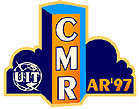

 |
 |
||
|
|
Telephone: +41 22 730 6039
Fax: +41 22 730 5939
E-mail: pressinfo@itu.int
In early June 1997, at the Palais des congrès in Bamako, the Minister of Culture and Communication, Bakary Koniba Traoré, opened a preparatory meeting of African countries to prepare for the 1997 World Radiocommunication Conference (WRC-97), to be held in Geneva from 27 October to 21 November. Organized by the Société des télécommunications du Mali (SOTELMA) with the collaboration of the Radiocommunication Bureau (BR) of the International Telecommunication Union (ITU), the Bamako meeting was attended by representatives from the administrations of some 30 African countries.
Papers were presented on some of the key issues on the agenda of WRC-97, namely, Resolution 18 (Review of the ITU's frequency coordination and planning framework for satellite networks), HF broadcasting, the maritime and aeronautical services, the mobile-satellite and fixed-satellite services, the space scientific services and the revision of Appendices 30 and 30A.
While the papers were very informative, due to lack of time, they were not dealt with in depth. For that reason, the meeting recommended that the Pan-African Telecommunication Union (PATU) and the ITU should continue to give assistance for the regular holding of different meetings on radiocommunications in Africa.
In the interests of being better prepared to move forward into the third millennium — dubbed the millennium of communication — and of making an effective contribution to the debates at the world conference, it is only natural, said Mr Traoré, that the Africans — the "smaller players" — should, on the eve of this major meeting, begin by getting together to harmonize their positions and exchange ideas on the main radiocommunication issues.
This is all the more important, as WRC-97 will be focusing on extension of the mobile-satellite service in the context of the development of global mobile personal communications by satellite (GMPCS), which is set to constitute one of the main elements of the global information infrastructure (GII). Development of the GII raises the problem of the survival of fixed services in the light of the use by satellites of the 2 GHz band hitherto used by terrestrial radio-relay systems. Satellite broadcasting, the Minister recalled, is a matter of concern to African countries: with the development of digital technologies, planning of the broadcasting-satellite service (BSS) bands must take account of concerns relating to the unauthorized reception within the territories of those countries with transmissions originating elsewhere.
Mr Traoré went on to point out that HF broadcasting was another matter of concern, expressing the wish that changes in the planning system should not affect the interests of the developing countries when they make their requirements known to the BR.
In view of all these questions, and of the limited radio-frequency resources, from which every country should be able to satisfy its requirements, WRC-97 was of particular importance for African countries.
African administrations expressed great gratitude to the ITU, which alone could bring about an improvement in planning and coordination procedures and guarantee all countries equitable access to the radio-frequency spectrum. They expressed the hope that the various decisions to be taken by the WRC-97 would be favourable to the developing countries’ interests.
|
Officers of the meeting |
| Chairman: Mali |
| Vice-Chairman: Tanzania |
| Rapporteurs: Cameroon, Guinea, Mali, Uganda and the Radiocommunication Bureau |
* This text is based on a contribution by Venant Bagayogo, published in the newspaper L'Essor (Mali), and a record prepared by the Rapporteurs of the preparatory meeting of African countries. It appeared in ITU News 8/97.